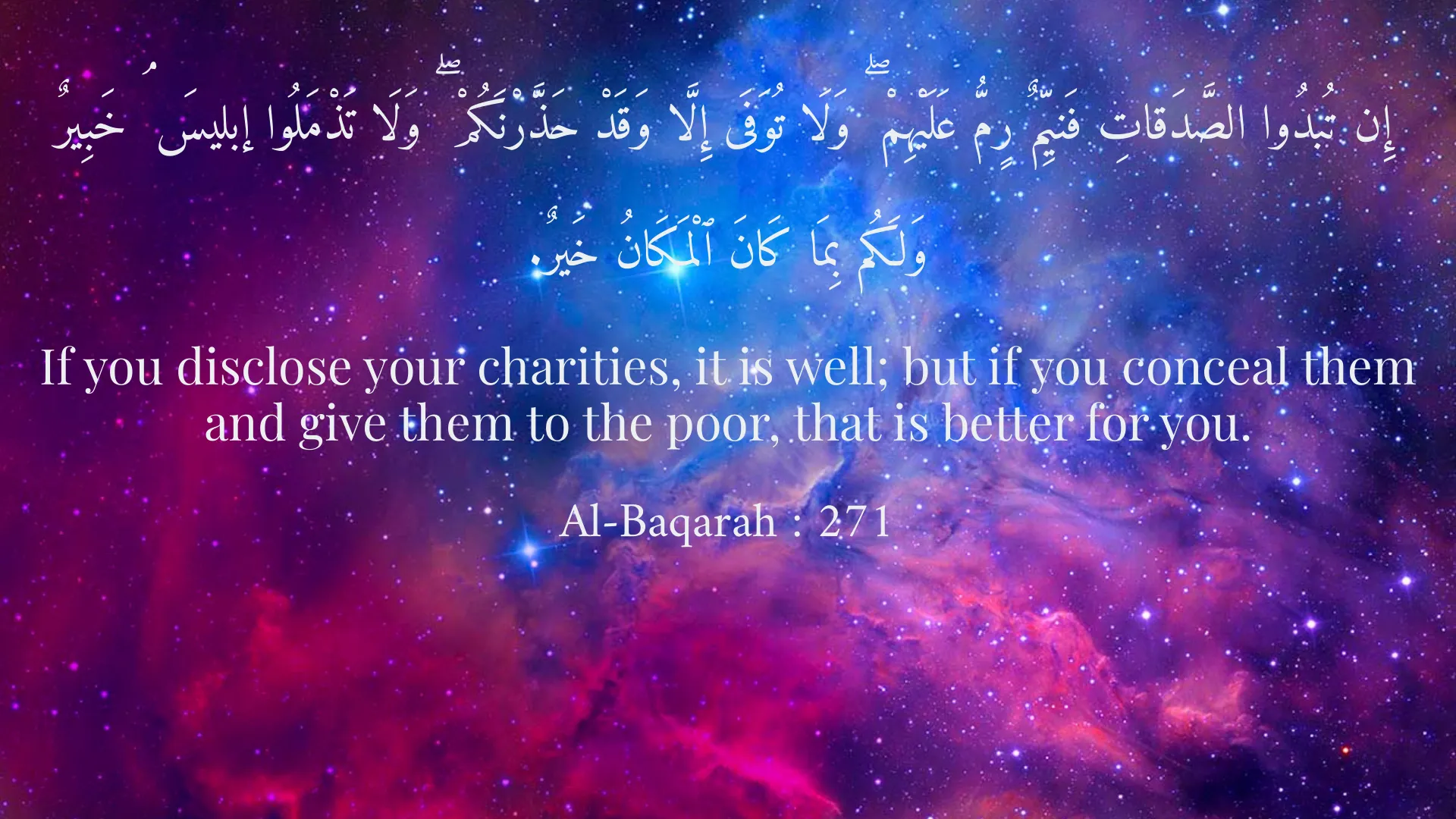Quranic Answer

The Holy Quran is a timeless guide that addresses the ethical, spiritual, and moral conduct of individuals in society. Among its various teachings, one of the most profound concepts captured within its verses is the significance of performing good deeds in secrecy. This notion resonates deeply within the Islamic faith, reflecting an overarching theme of sincerity and humility in all aspects of one’s actions. One of the pivotal verses that encapsulates this idea is found in Surah Al-Baqarah, verse 271, which states, "If you give your charity openly, it is good for you, but if you conceal it and give it to the poor, it is better for you." This verse serves not only as a guideline for charitable acts but also as a deep contemplation on the intentions behind those acts. To delve deeper into this concept, the distinction between performing good deeds openly and in secrecy is paramount. While charitable acts performed publicly can indeed raise awareness and inspire others to contribute to charitable causes, it is the hidden good deeds that are viewed as possessing a higher value in the sight of Allah. This is because when one acts in secrecy, it reflects a more profound sincerity and a desire to please God above any desire for recognition or praise from others. The intention behind the act—known as ‘niyyah’ in Arabic—plays a crucial role in the acceptance of deeds by Allah. Hidden good deeds are often rooted in genuine compassion, fostering a deeper connection between the giver and the unit of society in need. Moreover, performing good deeds in secrecy helps preserve the dignity of those receiving help. The Quran emphasizes the importance of maintaining the honor of individuals who may already be in vulnerable situations. When charity is given discreetly, it upholds the self-respect of the receiver, thereby minimizing any feelings of shame or humiliation they might experience. The act of being charitable should resonate as a form of compassion without the need for public acknowledgment. In contrast, Surah Al-Mutaffifin serves as a cautionary warning against the behaviors of those who perform acts for show and hypocrisy. Allah explicates how some individuals manipulate the perception of good deeds, engaging in actions that are not genuine and are driven by a desire for recognition rather than an earnest wish to help. This hypocrisy detracts from the spiritual essence of the act, potentially corrupting the purity of intention. When individuals prioritize public acclaim over sincere assistance to those in need, the intrinsic value of their good deeds diminishes significantly. Furthermore, practicing acts of kindness in secrecy cultivates a sense of humility within the individual. By intentionally avoiding the limelight when performing good deeds, one learns to detach from the validation of society. Such humility is a core teaching of Islam, emphasizing selflessness and devotion to the Creator. This state of being forms a counter-narrative to the culture of showcasing one’s accomplishments for social validation. The more one practices humility through hidden acts of kindness, the more spiritually elevated they become, nurturing traits of gratitude, empathy, and awareness of their own shortcomings. As an illustration of this concept, consider the profound lesson exemplified in the life of Prophet Muhammad (peace be upon him). His life was a testament to performing acts of kindness without seeking recognition. From feeding the hungry to assisting the needy, his approach was rooted in sincerity and a commitment to serving God. This serves as an archetype for Muslims, urging them to engage in good deeds quietly and earnestly. Spiritual elevation through hidden good deeds not only brings an individual closer to Allah but can also lead to a greater fulfillment in life. When one engages in these actions with the intention of pleasing God, they often experience a sense of peace and joy that transcends worldly recognition. This divine connection reinforces their faith and commitment to living a life that mirrors the virtues highlighted in the Quran. In conclusion, the act of performing good deeds in secrecy is a powerful concept that is deeply embedded in the teachings of the Quran. The emphasis on sincerity, compassion, and humility serves to elevate the spiritual state of individuals while enriching the lives of those around them. By internalizing the teachings laid out in Surah Al-Baqarah and recognizing the potential pitfalls of pride and showiness warned against in Surah Al-Mutaffifin, believers can find a more enriching, fulfilling path in their charitable actions. Ultimately, the call to perform good deeds on the quiet is not just an instruction but a pathway to spiritual enlightenment and closeness to Allah, reaffirming the values that stand at the core of the Islamic faith.
Related Verses
إِن تُبدُوا الصَّدَقاتِ فَنيِّمٌ رٍمُّ عَلَيْهِمْ ۖ وَلَا تُوَفَى إِلَّا وَقَدْ حَذَّرْنَكُمْ ۖ وَلَا تَذْمَلُوا إبليسَ ۘ خَبِيرٌ وَلَكُم بِمَا كَانَ ٱلْمَكَانُ خَيرٌ.
If you disclose your charities, it is well; but if you conceal them and give them to the poor, that is better for you.
Al-Baqarah : 271
وَيْلٌ لِّلْمُطَفِّفِينَ
Woe to those who give less.
Al-Mutaffifin : 1
Short Story
Once upon a time, a young man named Hasan decided to perform good deeds solely for the pleasure of Allah. He knew that doing good in secrecy was better. So, every day he saved some of his pocket money and placed it at the doors of those in need at night without revealing his identity. After some time, Hasan felt that not only was he changing the lives of the poor, but he was also attaining more peace and happiness himself.